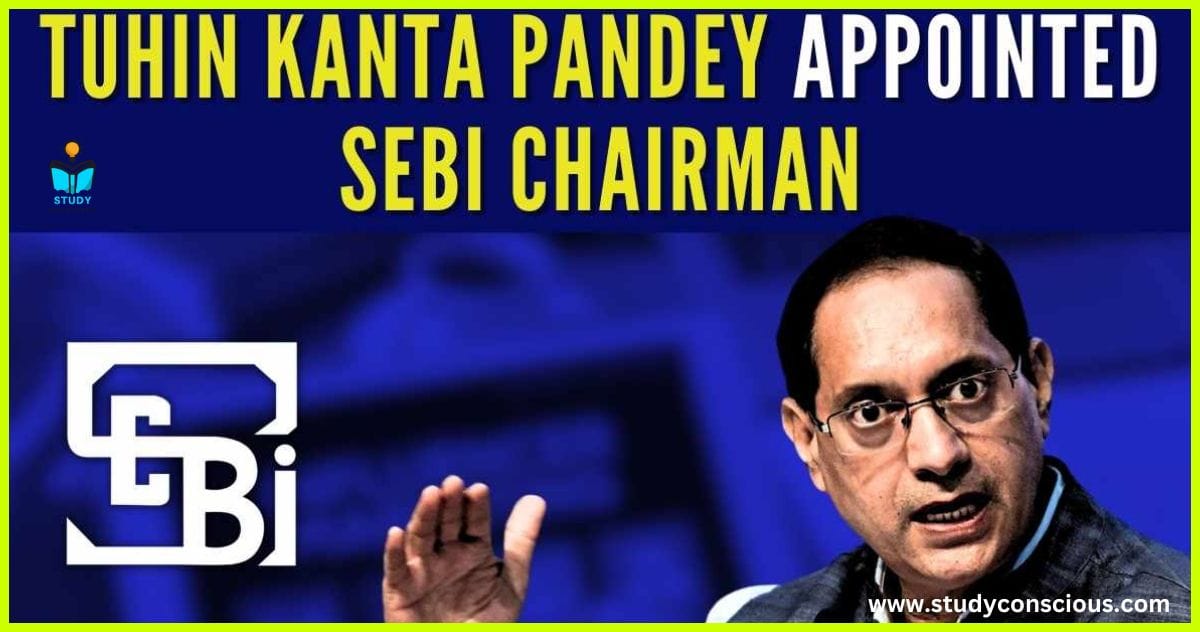Shri Tuhin Kanta Pandey assumed the role of the 11th Chairman of the Securities and Exchange Board of India (SEBI) on March 1, 2025, succeeding Ms. Madhabi Puri Buch, whose term concluded on February 28, 2025.

Professional Background:
- Indian Administrative Service (IAS): A 1987-batch IAS officer from the Odisha cadre, Shri Pandey has held various significant positions in both state and central governments.
- Department of Investment and Public Asset Management (DIPAM): Prior to his appointment as SEBI Chairman, he served as the Secretary of DIPAM, where he played a pivotal role in strategic disinvestments and asset monetization initiatives.
Educational Qualifications:
- Panjab University: Shri Pandey is an alumnus of Panjab University, where he completed his undergraduate studies.
- MBA from the UK: He further enhanced his academic credentials by earning an MBA from a reputed institution in the United Kingdom.
Transition at SEBI:
Upon his arrival at SEBI’s headquarters, Shri Pandey was welcomed by the whole-time members of the Board. Notably, Ms. Buch was unable to attend the handover ceremony due to health reasons.
Immediate Challenges and Expectations:
As the new SEBI Chairman, Shri Pandey faces the critical task of restoring investor confidence amidst recent market fluctuations. His extensive experience in financial administration is anticipated to contribute significantly to strengthening market regulations and ensuring investor protection.
SEBI (Securities and Exchange Board of India) is the regulatory body for the securities and capital markets in India. It was established in 1988 and given statutory powers in 1992 under the SEBI Act. Its primary role is to protect investors’ interests, regulate the securities market, and ensure its smooth functioning.
History of SEBI (Securities and Exchange Board of India)
The Securities and Exchange Board of India (SEBI) was established to regulate the securities market and protect investors from malpractices. Here’s a brief history of its evolution:
1. Pre-SEBI Era (Before 1988)
- Before SEBI, the capital markets in India were regulated by the Controller of Capital Issues (CCI) under the Capital Issues (Control) Act, 1947.
- There was no dedicated regulator, leading to malpractices like price rigging, insider trading, and lack of transparency.
2. Establishment of SEBI (1988)
- The Government of India established SEBI on April 12, 1988, as a non-statutory body to regulate the securities market.
- It acted as a watchdog, but had no legal powers to enforce regulations.
3. SEBI Becomes a Statutory Body (1992)
- In response to major market scams (like the Harshad Mehta Scam of 1992), the government passed the SEBI Act, 1992, giving SEBI statutory powers.
- It became the official regulator of the securities market, replacing the Controller of Capital Issues (CCI).
4. Key Milestones and Reforms
1995–2000: Strengthening Regulations
- Mandatory registration for market intermediaries (brokers, mutual funds, etc.).
- Introduced Disclosure & Investor Protection Guidelines for transparency in IPOs.
- Established the Securities Appellate Tribunal (SAT) in 1995 for investor grievances.
2000–2010: Digitalization & Market Reforms
- Dematerialization of shares (electronic trading through demat accounts).
- T+2 settlement cycle introduced (reducing settlement period).
- Stronger insider trading regulations and corporate governance reforms.
2010–Present: Advanced Regulations
- SEBI (Prohibition of Insider Trading) Regulations, 2015 tightened norms for insider trading.
- SEBI (Listing Obligations and Disclosure Requirements) Regulations, 2015 improved corporate transparency.
- Merger of Forward Markets Commission (FMC) with SEBI in 2015 brought commodity markets under SEBI’s regulation.
- In 2021, SEBI introduced tighter norms for IPOs and mutual funds to protect retail investors.
Present Role of SEBI
Today, SEBI continues to regulate the stock markets, mutual funds, FIIs, and corporate governance, ensuring transparency and investor protection.
Here’s a chronological list of SEBI’s chairpersons:
Dr. S.A. Dave (April 12, 1988 – August 23, 1990)
Dr. Dave was SEBI’s inaugural chairman, laying the foundation for India’s securities market regulation.
Shri G.V. Ramakrishna (August 24, 1990 – January 17, 1994)
He played a pivotal role in strengthening SEBI’s regulatory framework during the early 1990s.
Shri S.S. Nadkarni (January 17, 1994 – January 31, 1995)
His tenure contributed to the ongoing development of SEBI’s oversight capabilities.
Shri D.R. Mehta (February 21, 1995 – February 20, 2002)
Under his leadership, SEBI introduced significant reforms to enhance market transparency and investor protection.
Shri G.N. Bajpai (February 20, 2002 – February 18, 2005)
His term focused on modernizing the securities market and improving regulatory mechanisms.
Shri M. Damodaran (February 18, 2005 – February 18, 2008)
He emphasized corporate governance and implemented measures to strengthen market integrity.
Shri C.B. Bhave (February 19, 2008 – February 17, 2011)
His tenure saw the promotion of investor education and the implementation of stricter regulatory norms.
Shri U.K. Sinha (February 18, 2011 – March 01, 2017)
He oversaw significant regulatory changes, including the introduction of new trading platforms and tighter scrutiny of financial intermediaries.
Shri Ajay Tyagi (March 01, 2017 – February 28, 2022)
His leadership was marked by major regulatory shifts, including stricter corporate governance norms and enhanced disclosure requirements.
Ms. Madhabi Puri Buch (March 01, 2022 – February 28, 2025)
Ms. Buch made history as SEBI’s first female chairperson. Her tenure focused on market integrity, investor protection, and regulatory efficiency.
Shri Tuhin Kanta Pandey (March 01, 2025 – Present)
Appointed as the current chairman, Shri Pandey brings decades of experience in economic policy and financial administration.
Some Important Blogs:
49वां सिविल लेखा दिवस: 2025 || 49th Civil Accounts Day: 2025
भारत स्नातक कौशल सूचकांक 2025 || India Graduate Skills Index 2025
51वां खजुराहो नृत्य महोत्सव: 2025 || 51st Khajuraho Dance Festival: 2025











